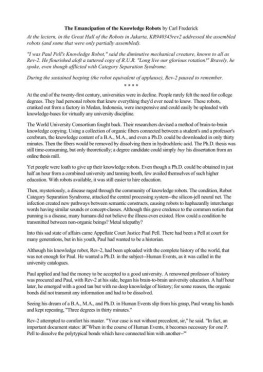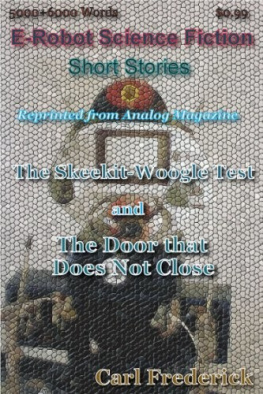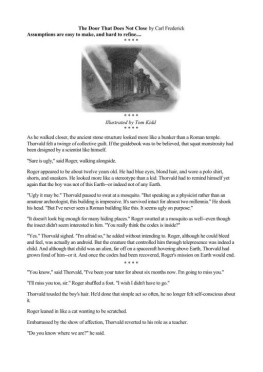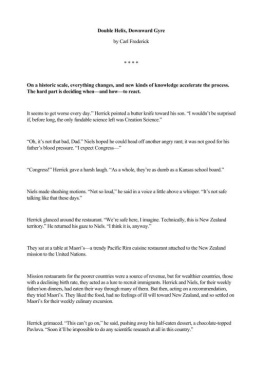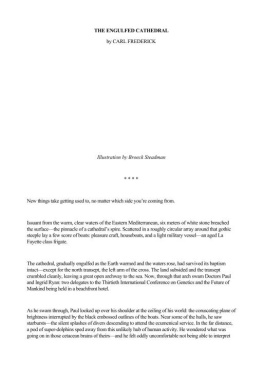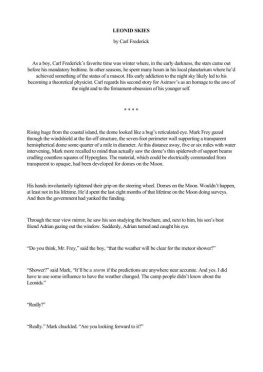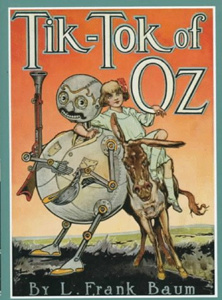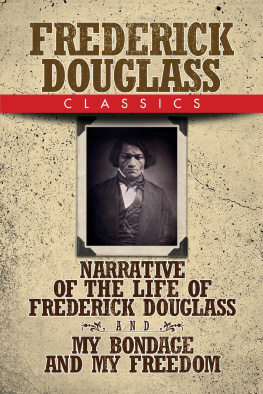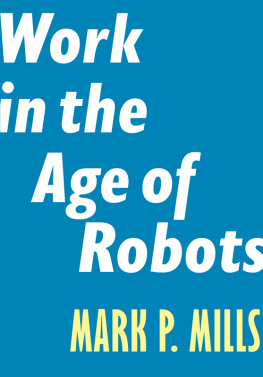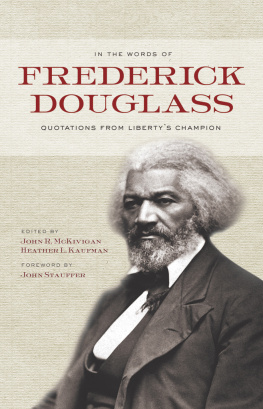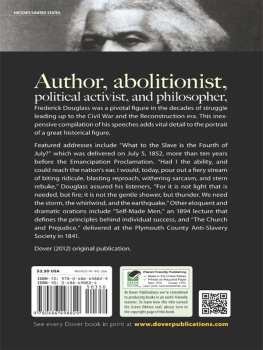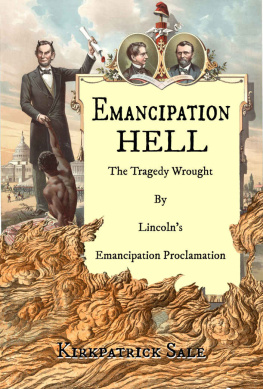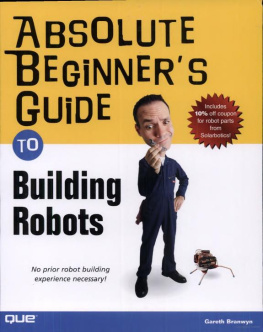Frederick - The Emancipation Of The Knowledge Robots
Here you can read online Frederick - The Emancipation Of The Knowledge Robots full text of the book (entire story) in english for free. Download pdf and epub, get meaning, cover and reviews about this ebook. year: 2010, genre: Home and family. Description of the work, (preface) as well as reviews are available. Best literature library LitArk.com created for fans of good reading and offers a wide selection of genres:
Romance novel
Science fiction
Adventure
Detective
Science
History
Home and family
Prose
Art
Politics
Computer
Non-fiction
Religion
Business
Children
Humor
Choose a favorite category and find really read worthwhile books. Enjoy immersion in the world of imagination, feel the emotions of the characters or learn something new for yourself, make an fascinating discovery.
- Book:The Emancipation Of The Knowledge Robots
- Author:
- Genre:
- Year:2010
- Rating:3 / 5
- Favourites:Add to favourites
- Your mark:
- 60
- 1
- 2
- 3
- 4
- 5
The Emancipation Of The Knowledge Robots: summary, description and annotation
We offer to read an annotation, description, summary or preface (depends on what the author of the book "The Emancipation Of The Knowledge Robots" wrote himself). If you haven't found the necessary information about the book — write in the comments, we will try to find it.
The Emancipation Of The Knowledge Robots — read online for free the complete book (whole text) full work
Below is the text of the book, divided by pages. System saving the place of the last page read, allows you to conveniently read the book "The Emancipation Of The Knowledge Robots" online for free, without having to search again every time where you left off. Put a bookmark, and you can go to the page where you finished reading at any time.
Font size:
Interval:
Bookmark:
At the lectern, in the Great Hall of the Robots in Jakarta, KR940345rev2 addressed the assembledrobots (and some that were only partially assembled).
"I was Paul Pell's Knowledge Robot," said the diminutive mechanical creature, known to all asRev-2. He flourished aloft a tattered copy of R.U.R. "Long live our glorious rotation!" Bravely, hespoke, even though afflicted with Category Separation Syndrome.
During the sustained beeping (the robot equivalent of applause), Rev-2 paused to remember.
* * * *
At the end of the twenty-first century, universities were in decline. People rarely felt the need for college degrees. They had personal robots that knew everything they'd ever need to know. These robots, cranked out from a factory in Medan, Indonesia, were inexpensive and could easily be uploaded with knowledge-bases for virtually any university discipline.
The World University Consortium fought back. Their researchers devised a method of brain-to-brain knowledge copying. Using a collection of organic fibers connected between a student's and a professor's cerebrum, the knowledge content of a B.A., M.A., and even a Ph.D. could be downloaded in only thirty minutes. Then the fibers would be removed by dissolving them in hydrochloric acid. The Ph.D. thesis was still time-consuming, but only theoretically; a degree candidate could simply buy his dissertation from an online thesis mill.
Yet people were loath to give up their knowledge robots. Even though a Ph.D. could be obtained in just half an hour from a combined university and tanning booth, few availed themselves of such higher education. With robots available, it was still easier to hire education.
Then, mysteriously, a disease raged through the community of knowledge robots. The condition, Robot Category Separation Syndrome, attacked the central processing system--the silicon-jell neural net. The infection created new pathways between semantic constructs, causing robots to haphazardly interchange words having similar sounds or concept-classes. Although this gave credence to the common notion that punning is a disease, many humans did not believe the illness even existed. How could a condition be transmitted between non-organic beings? Metal telepathy?
Into this sad state of affairs came Appellate Court Justice Paul Pell. There had been a Pell at court for many generations, but in his youth, Paul had wanted to be a historian.
Although his knowledge robot, Rev-2, had been uploaded with the complete history of the world, that was not enough for Paul. He wanted a Ph.D. in the subject--Human Events, as it was called in the university catalogues.
Paul applied and had the money to be accepted to a good university. A renowned professor of history was procured and Paul, with Rev-2 at his side, began his brain-to-brain university education. A half hour later, he emerged with a good tan but with no deep knowledge of history; for some reason, the organic bonds did not transmit any information and had to be dissolved.
Seeing his dream of a B.A., M.A., and Ph.D. in Human Events slip from his grasp, Paul wrung his hands and kept repeating, "Three degrees in thirty minutes."
Rev-2 attempted to comfort his master. "Your case is not without precedent, sir," he said. "In fact, an important document states: When in the course of Human Events, it becomes necessary for one P. Pell to dissolve the polytypical bonds which have connected him with another--'"
"Three degrees, thirty minutes," Paul repeated, not paying attention. Then he wrinkled his nose. "Wait!" he said. "That's the Declaration of Independence."
"No, sir. It's the declination of Indonesia."
"What?"
"Medan, Indonesia. 3 degrees, 30 minutes, South."
"What?" said Paul, again. "Anyway, that's latitude.'"
"You're quite right, sir," said the robot. "I am taking some latitude. Medan is actually three degrees, thirty- five minutes, South."
Paul regarded his robot in silence for a few seconds. "Category Separation Syndrome?" he said, softly.
"Yes, sir." There was no mistaking the genuine sadness in that artificial voice.
"I'm sorry." Paul swiveled to confront his professor. "My Human Events transfer. What went wrong?"
"Probably data overload," said the professor, looking down his nose at his failed student. "I suggest you might attempt a simpler course of study, perhaps theoretical physics or flower arrangement." Paul stormed out of the tanning booth.
When he'd calmed down, Paul reapplied to the university to try once more for his Ph.D. in history, but was not readmitted. Embittered, he applied yet again, but the university declined to take the bitter Pell. He sued to be admitted, but lost.
Paul, appalled, appealed--and lost again.
But sometimes, as the saying goes, "'Tis better to have loved and lost than never to have lost at all." Paul resolved then to spend his professional life working both to curb the power of the universities and also to improve the lot of sentient robots. To further those aims, he entered law school.
The following day, degrees in hand, he took a job as an investigative reporter. In his first assignment, he uncovered the dirty secret that those dark, satanic thesis mills where disembodied robots--naked brains--churned out countless theses, were, in fact, owned by the University Consortium. Then, following up, he discovered the damning bombshell; researchers from the Consortium had actually created the robot disease, and it was spread through shared test leads. (The robot test-cable receptacle functions very much like a taste organ in humans.)
The rest is history.
Paul's work to advance the cause of the robots culminated in that great document of robot emancipation, The Magna Jakarta.
For the rest of his life, Paul and Rev-2 worked side-by-side and when Paul died, Rev-2 was a pallbearer.
* * * *
"Remember," Rev-2 exhorted from the lectern. "A little knowledge robot is a dangerous thing."Here, he became serious. "Yes, it is appropriate to honor Paul Pell and also our creators, theassembly robots of Medan, but, my brothers, we must alert all robotkind. Don't taste those testleads, no matter how much you are tempted. We can lick Category Separation Syndrome.Remember, he who has a taste is lost."
The Alternate View: Will We Return to the Moon? by Jeffery D. Kooistra
On a day wedged between the twin gulf-coastal hurricane catastrophes of Katrina and Rita, NASA released plans for how we'll return to the Moon by 2018. New NASA administrator Michael Griffin (of whom I have heard exceptionally positive things) has called it " Apollo on steroids," and that's an apt description.
I was nine when we landed on the Moon the first time. I had models of the Apollo spacecraft. I loved watching those gigantic Saturn V boosters take off. "Ignition sequence start" was always said at about "T
minus 7", then right at zero I'd wait to hear the voice of mission control say, "Lift-off! We have lift-off!" as I watched that monster rocket spear the sky. I knew the whole routine--first stage, second stage, and finally third stage to space and on the way to the Moon. The command and service module unit would separate from the third stage, turn around and dock with the LEM, and then the ungainly pair would continue on to Luna.
Ah, the good old days. Most of you readers were there with me.
The new plan is very much like the old one, and that's okay--what worked then will work now, and there were good reasons for doing things the way we did back then. But the current plan comes with some very important differences.
Though the main passenger module, dubbed the "crew exploration vehicle" or CEV, looks a lot like the
Next pageFont size:
Interval:
Bookmark:
Similar books «The Emancipation Of The Knowledge Robots»
Look at similar books to The Emancipation Of The Knowledge Robots. We have selected literature similar in name and meaning in the hope of providing readers with more options to find new, interesting, not yet read works.
Discussion, reviews of the book The Emancipation Of The Knowledge Robots and just readers' own opinions. Leave your comments, write what you think about the work, its meaning or the main characters. Specify what exactly you liked and what you didn't like, and why you think so.

